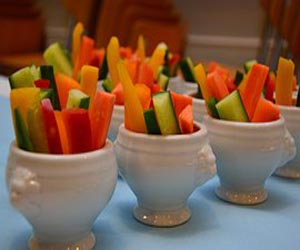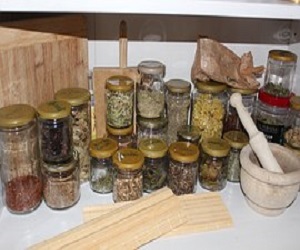


Elevate Your Culinary Skills In The Kitchen

Cooking is a delightful and essential life skill that can transform mundane ingredients into delectable dishes. Whether you're a novice or a seasoned cook, there's always room for improvement. In this article, we'll explore a variety of cooking tips to help you enhance your culinary abilities and make your time in the kitchen more enjoyable and efficient.
1. Prep Work Matters
Before you even turn on the stove, take the time to properly prepare your ingredients. This includes washing, chopping, and measuring everything you'll need for the recipe. It not only saves you time during cooking but also ensures a smoother process and minimizes the chances of missing an ingredient.
2. Invest In Quality Knives
A sharp and high-quality knife is your best friend in the kitchen. Invest in a good chef's knife and keep it sharp. A well-maintained knife makes chopping, slicing, and dicing a breeze, and it's safer to use than a dull one.
3. Master Basic Knife Skills
Knowing how to properly handle a knife is as important as having a sharp one. Learn essential knife skills like the claw grip to protect your fingers, and practice techniques like chopping, mincing, and julienning for precision in your cuts.
4. Control Your Heat
Understanding temperature control is crucial in cooking. Learn the difference between simmering, boiling, sautéing, and searing. Adjusting the heat appropriately can prevent overcooking, burning, or undercooking your dishes.
5. Taste As You Go
Taste your food as you cook. This allows you to adjust seasoning and flavors along the way. Don't be afraid to add more salt, pepper, or other seasonings if necessary. A balanced and well-seasoned dish is the hallmark of a great cook.
6. Keep Your Workspace Organized
A cluttered kitchen can lead to confusion and accidents. Keep your workspace tidy by cleaning as you go and returning items to their proper places when you're done with them. An organized kitchen will help you stay focused and efficient.
7. Get To Know Your Ingredients
Understanding your ingredients is crucial to successful cooking. Know the flavor profiles of herbs and spices, and learn how different ingredients interact with each other. This knowledge will allow you to create more harmonious and well-balanced dishes.
8. Use Fresh Ingredients
Whenever possible, use fresh ingredients. Fresh produce, meats, and dairy can make a significant difference in the taste and quality of your dishes. Seasonal and local ingredients can be especially flavorful.
9. Experiment And Learn
Don't be afraid to experiment in the kitchen. Try new recipes, techniques, and ingredients. Mistakes are part of the learning process, and they often lead to unexpected discoveries.
10. Practice Patience
Lastly, practice patience in cooking. Rushing through a recipe can lead to mistakes and uneven results. Give your dishes the time they need to develop their flavors and textures.
Cooking is a journey of continual improvement, and these cooking tips can help you hone your skills and expand your culinary horizons. Embrace the joy of creating delicious meals, and let your passion for cooking shine in every dish you prepare. With time, practice, and a dash of creativity, you can become a confident and skilled home chef.
Nurturing Mind, Body, And Soul For A Balanced Life
 Key Components Of Holistic Wellness
Key Components Of Holistic Wellness
Physical Health: This includes aspects such as nutrition, exercise, sleep, and managing chronic conditions. A balanced diet, regular physical activity, and proper rest are fundamental to physical well-being.
Mental Health: Mental wellness involves emotional stability, resilience, and a positive mindset. It encompasses managing stress, nurturing creativity, and fostering a sense of purpose.
Emotional Health: Emotional well-being relates to understanding and managing one's emotions. It involves recognizing and expressing feelings, as well as developing strategies to handle emotional challenges.
Spiritual Health: Spiritual wellness isn't necessarily tied to religion; it's about finding a sense of purpose, meaning, and connection to something greater than ourselves. This can involve self-reflection, mindfulness, or meditation.
Social Connections: Building and maintaining meaningful relationships with friends, family, and the community is a key component of holistic wellness. A strong support system contributes to happiness and provides a safety net during difficult times.
Environmental Wellness: This focuses on our relationship with the environment, emphasizing the importance of a clean, safe, and sustainable living space.
Cultivating Holistic Wellness
Mindful Living: Practice mindfulness by being fully present in the moment. This involves paying attention to your thoughts, feelings, and physical sensations. Mindful living can help reduce stress and enhance emotional and mental well-being.


The Transformative Power Of Thankfulness
 Boosting Positivity: A gratitude practice helps us develop a more positive mindset. It encourages us to look for the silver lining in challenging situations and embrace a glass-half-full perspective. This positive outlook not only uplifts our mood but also enhances our overall mental well-being.
Boosting Positivity: A gratitude practice helps us develop a more positive mindset. It encourages us to look for the silver lining in challenging situations and embrace a glass-half-full perspective. This positive outlook not only uplifts our mood but also enhances our overall mental well-being.
Enhancing Self-Esteem: Expressing gratitude for our accomplishments and personal growth can boost our self-esteem. When we acknowledge our achievements, no matter how small, it reinforces our sense of self-worth. This, in turn, contributes to improved mental health and a more positive self-image.
Fostering Resilience: Gratitude is a tool that can help us bounce back from setbacks and adversity. By finding things to be thankful for even in challenging times, we build emotional resilience. This allows us to face life's difficulties with greater strength and adaptability.
Strengthening Relationships: Gratitude is not limited to self-reflection; it also extends to our relationships with others. Expressing appreciation and thankfulness toward friends, family, and colleagues fosters deeper and more meaningful connections. These relationships provide a vital support system for maintaining mental well-being.
Promoting Mindfulness: Gratitude encourages us to be present in the moment and notice the beauty and goodness around us. This practice aligns with mindfulness, a powerful tool for mental health. By being fully engaged in the present and appreciating it, we reduce rumination and promote a more peaceful state of mind.
Fueling Your Health And Well-Being
 Understanding Eating Habits
Understanding Eating Habits
Eating habits are the routines and behaviors associated with our food consumption. These habits encompass not only what we eat but also how we eat, when we eat, and why we eat. They are shaped by various factors, including cultural, social, emotional, and environmental influences. Our eating habits are a reflection of our relationship with food, and they can have both positive and negative consequences.
The Impact Of Eating Habits
Nutritional Health: Eating habits directly affect our nutritional health. A balanced diet that includes a variety of nutrients is essential for the proper functioning of our bodies. Healthy eating habits can reduce the risk of chronic diseases and promote overall wellness.
Weight Management: Our eating habits have a significant impact on weight management. Overeating, frequent snacking, or consuming unhealthy foods can lead to weight gain and obesity, while mindful eating and portion control support weight maintenance.
Mental Health: Eating habits are linked to mental health. Emotional eating, stress eating, and disordered eating patterns can negatively affect our emotional well-being. Conversely, a balanced diet with the right nutrients can support mental health and cognitive function.
Energy Levels: The foods we consume can impact our energy levels. Poor eating habits, such as consuming sugary or processed foods, can lead to energy spikes and crashes, while a diet rich in complex carbohydrates, protein, and fiber provides sustained energy.
Digestive Health: Eating habits also influence digestive health. Consuming fiber-rich foods, staying hydrated, and practicing portion control contribute to a healthy digestive system and prevent issues like constipation or indigestion.
Cultivating Healthy Eating Habits
Mindful Eating: Pay attention to what you eat and how it makes you feel. Eat slowly, savor each bite, and listen to your body's hunger and fullness cues.
Balanced Diet: Strive to include a variety of whole foods in your diet, such as fruits, vegetables, lean proteins, whole grains, and healthy fats. Avoid excessive consumption of processed foods and added sugars.






Bridging Tradition And Science
 Evidenced-Based Herbal Medicine
Evidenced-Based Herbal Medicine
One of the most significant developments in modern herbal knowledge is the growing body of scientific evidence supporting the efficacy and safety of herbal remedies. Researchers are conducting clinical trials and studies to investigate the therapeutic properties of specific herbs, validating many traditional uses. For instance, herbs like St. John's Wort have demonstrated their effectiveness in treating mild to moderate depression.
Herbs In Complementary Medicine
Modern healthcare is increasingly embracing the concept of complementary medicine, where herbal knowledge is integrated into conventional treatments. Many healthcare practitioners recommend herbal supplements alongside conventional medications to enhance treatment outcomes and minimize side effects.
Holistic Health And Herbal Medicine
Herbal knowledge aligns well with the principles of holistic health. It recognizes the interconnectedness of physical, emotional, and mental well-being. Herbal remedies are often employed to address not only physical symptoms but also the root causes of ailments, which can include stress, poor diet, or emotional imbalances.
Herbs For Chronic Conditions
Herbal medicine is gaining recognition for its role in managing chronic conditions. Conditions like diabetes, hypertension, and arthritis can often be improved with the use of specific herbs. For instance, cinnamon has shown promise in helping regulate blood sugar levels in individuals with diabetes.
Natural Remedies For Mental Health
Herbs are increasingly used in the management of mental health conditions. Plants like lavender, chamomile, and valerian are valued for their calming and anxiety-reducing effects. They offer a gentler alternative to pharmaceuticals for individuals seeking natural solutions to anxiety, stress, and depression.
Safety And Regulation
As herbal remedies become more popular, it's essential to address safety and regulation. Many countries have regulatory agencies that oversee the production and sale of herbal supplements, ensuring quality and safety. Additionally, consulting with a qualified herbalist or healthcare practitioner is crucial to avoid potential interactions with medications and ensure proper dosing.
 One of the primary benefits of mindfulness is its ability to reduce stress. Mindful meditation and breathing techniques can help individuals manage the overwhelming stressors of modern life. By focusing on the present moment, individuals can break free from the cycle of worry about the future or dwelling on the past. This mental shift allows them to experience a sense of calm and relaxation, reducing their stress levels.
One of the primary benefits of mindfulness is its ability to reduce stress. Mindful meditation and breathing techniques can help individuals manage the overwhelming stressors of modern life. By focusing on the present moment, individuals can break free from the cycle of worry about the future or dwelling on the past. This mental shift allows them to experience a sense of calm and relaxation, reducing their stress levels.
Furthermore, mindfulness promotes mental clarity and emotional balance. In a world filled with distractions, our minds can become cluttered, making it difficult to concentrate and find inner peace. Mindfulness helps in decluttering the mind and provides a clear space for focused thinking. It also allows individuals to observe their emotions without reacting impulsively, fostering emotional stability and resilience.
Meditation, a core component of mindfulness, is a practice that enables individuals to delve deep into their inner selves. Through regular meditation, people can develop a better understanding of themselves and their thought patterns. This self-discovery is instrumental in cultivating inner peace. By recognizing their thought patterns and emotional responses, individuals can make conscious choices about how they react to various situations, leading to a greater sense of control and inner harmony.
Mindfulness is not limited to the individual; it also extends to the way we connect with the world. By being present and fully engaged in our interactions and surroundings, we foster a deeper connection with the people and environment around us. This connection promotes empathy, compassion, and a sense of belonging, which are integral to overall well-being and inner peace.